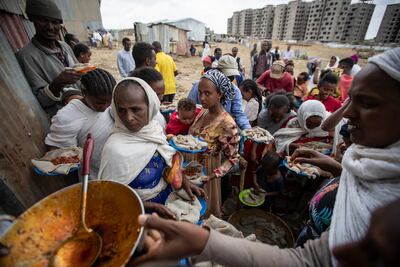Tigrayan rebels agreed to a "cessation of hostilities" on Friday in a new turning point in the nearly 17-month war in northern Ethiopia.
It comes after the government's announcement of an indefinite humanitarian truce a day earlier.
The rebels said in a statement sent to AFP early on Friday that they were "committed to implementing a cessation of hostilities effective immediately", and urged Ethiopian authorities to hasten delivery of emergency aid to Tigray, where hundreds of thousands face starvation.
Since war broke out in November 2020, thousands have died, and many more have been forced to flee their homes as the conflict expanded from Tigray to the neighbouring regions of Amhara and Afar.
On Thursday, Prime Minister Abiy Ahmed's government declared a surprise truce, saying it hoped the move would ease humanitarian access to Tigray and "pave the way for the resolution of the conflict" in northern Ethiopia.
It called on the Tigray People's Liberation Front (TPLF) to "desist from all acts of further aggression and withdraw from areas they have occupied in neighbouring regions".
The rebels in turn urged "the Ethiopian authorities to go beyond empty promises and take concrete steps to facilitate unfettered humanitarian access to Tigray".
The conflict erupted when Mr Abiy sent troops into Tigray to topple the TPLF, the region's former ruling party, saying the move was a response to rebel attacks on army camps.

Fighting has dragged on for more than a year, with both sides accused of human rights offences including mass rape and massacres. More than 400,000 people have been displaced in Tigray, according to the UN.
The region has also been subject to what the UN says is a de facto blockade.
The United States accuses Mr Abiy's government of preventing aid from reaching those in need, while the authorities in turn blame the rebels for the obstruction.
Nearly 40 per cent of the people in Tigray, a region of six million people, face "an extreme lack of food", the UN said in January, with fuel shortages forcing aid workers to deliver medicines and other crucial supplies on foot.
Western nations have been urging both sides to agree to a ceasefire, and the US, the European Union, the UK and Canada hailed the truce declaration.
Secretary of State Antony Blinken said the US "urges all parties to build on this announcement to advance a negotiated and sustainable ceasefire, including necessary security arrangements".
Diplomats led by Olusegun Obasanjo, the African Union's special envoy for the Horn of Africa, have been trying for months to broker peace talks, with little evident progress so far.
The government declared a "unilateral ceasefire" in Tigray in June last year, after the TPLF mounted a shock comeback and retook the region from federal forces before expanding into Amhara and Afar.
But fighting intensified in the second half of 2021, with the rebels at one point claiming to be within 200 kilometres of the capital Addis Ababa, before reaching a stalemate.



















